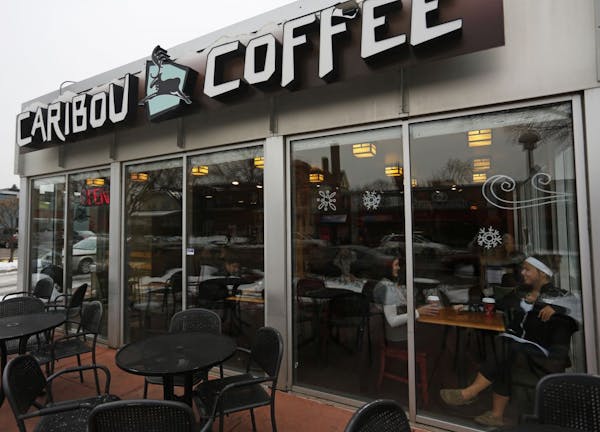Caribou Coffee, which retained a heavy Minnesota accent as it grew into the nation's No. 2 coffeehouse chain, said Monday it is being acquired for $340 million by a privately held German firm looking to expand its global coffee holdings.
Analysts don't expect big changes, from Caribou's suburban Minneapolis headquarters to the North Woods decor of its stores, after the sale to an affiliate of the Joh. A. Benckiser (JAB) Group, which invests in higher-end retail brands.
Brooklyn Center-based Caribou, which has been on a roll the past two years, said it will continue to operate with its own brand, management team and growth strategy. Though earlier this year JAB also bought California-based Peet's Coffee & Tea Inc., a similar concept to Caribou, analysts said they don't expect an operational merger of the two.
JAB indicated as much in a statement Monday. "Caribou has a fantastic brand and unique culture and fits perfectly with JAB's investment philosophy of investing in premium and unique brands in attractive growth categories like coffee," said Bart Becht, JAB's chairman.
JAB proposes to fork over $16 per share to Caribou's stockholders, a 30 percent premium over Caribou's closing price on Friday, pending shareholder approval of the deal. The German firm said it is committed to "investing in Caribou as a standalone business out of Minneapolis" once the buyout closes.
Though Caribou is dwarfed by coffeehouse behemoth Starbucks, it has 610 coffeehouses in 22 states, the District of Columbia and 10 international markets. About one-third of the Caribou locations are in Minnesota. Recently, it has been trying to develop the Chicago and Washington, D.C., markets.
"We anticipate the next chapter in Caribou's history will be filled with tremendous opportunities to grow this great brand," Caribou CEO Michael Tattersfield said in a statement.
The 20-year-old company declined to make Tattersfield available for comment.
Tattersfield, who is expected to stay on, became CEO in 2008 when Caribou was licking its wounds from overexpansion. The day Tattersfield was named CEO, Caribou's stock was at $1.74, near an all-time low. It had gone public at $14 three years earlier.
"The [Caribou] concept was stagnant," said Nicole Miller Regan, an analyst at Piper Jaffray. Under Tattersfield, "it went from standing still to an accelerated pace."
The company improved the quality of its products and rounded out its menu to include breakfast items and iced tea.
"This is a great human capital team for the first time in a long time," Regan said, referring to CEO turnover before Tattersfield. "This brand has genuine, authentic management."
Not just coffeehouses
The company's commercial coffee business has been surging. More than 20 percent of sales come from Caribou-branded coffee sold through grocery stores and food service channels, as well as through single servings for Keurig coffee machines.
With both retail and commercial segments firing on all cylinders, Caribou's stock hit an all-time high this spring of around $18. But it fell back significantly after investor expectations for the single-serve coffee market cooled off.
The fall-off started after Green Mountain Coffee Roasters, a heavy-hitter in the Keurig field and a Caribou business partner, reported a big slowdown in May. But worries over the single-serve market seemed to get "blown out of proportion," said Will Slabaugh, a stock analyst at Stephens Inc.
JAB may have capitalized on that. "Coffee is a growing segment, and I think [JAB] is taking advantage of the negative sentiment surrounding Green Mountain," Slabaugh said.
Matt Bendixen, an analyst at Craig-Hallum Capital, said Caribou's "fundamental business is pretty strong." In fact, Bendixen said, he wouldn't be surprised to see a rival bid for Caribou from another private equity group.
His target price for Caribou's stock is currently $19. And Peet's sold for a considerably higher multiple of profits -- a common acquisition yardstick -- than Caribou.
However, Slabaugh, Regan and other analysts have had targets of $16 on Caribou's stock.
"It's a very, very favorable bid," Regan said of JAB's $16 per share offer. Caribou's stock closed Monday at $16.10, up $3.78.
Bullish on coffee
JAB focuses on long-term investments in companies with premium brands in consumer goods, such as the majority stake in Peet's that it snapped up for $941 million.
Peet's has about 200 coffeehouses, mostly in the western United States, and also has a substantial business in grocery stores and other commercial channels. JAB also has a 15 percent stake in D.E. Master Blenders 1753 N.V., the former international coffee and tea holdings of Sara Lee Corp.
JAB has a majority stake in cosmetics and fragrance company Coty Inc., and it owns Labelux, a luxury leather-goods company with brands such as Jimmy Choo, Bally and Belstaff.
Caribou was created in 1992 by the husband-and-wife team of John Puckett and Kim Puckett. After operating a small coffee chain in Boston, the Dartmouth College business grads moved to the Twin Cities to launch Caribou.
But by 2000, Caribou was unable to access more capital, and the Pucketts left when an investment company, Crescent Capital, bought a majority stake. Crescent was an arm of the Arab investment bank First Islamic, which was later renamed Arcapita. It sold its stake over time, finishing in 2011.
Star Tribune staff writer Paul Walsh contributed to this report. Mike Hughlett • 612-673-7003
